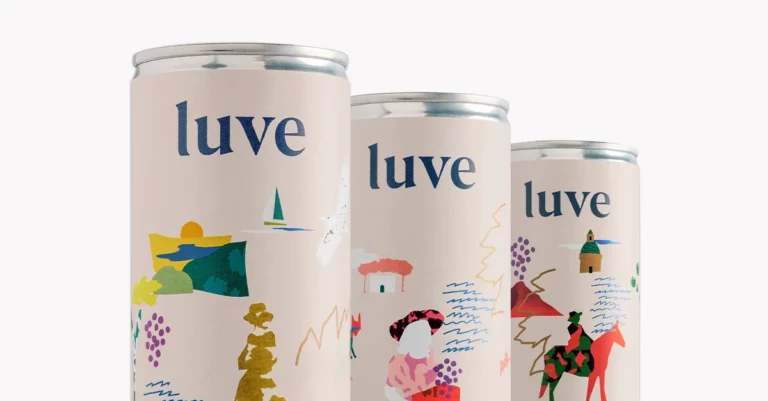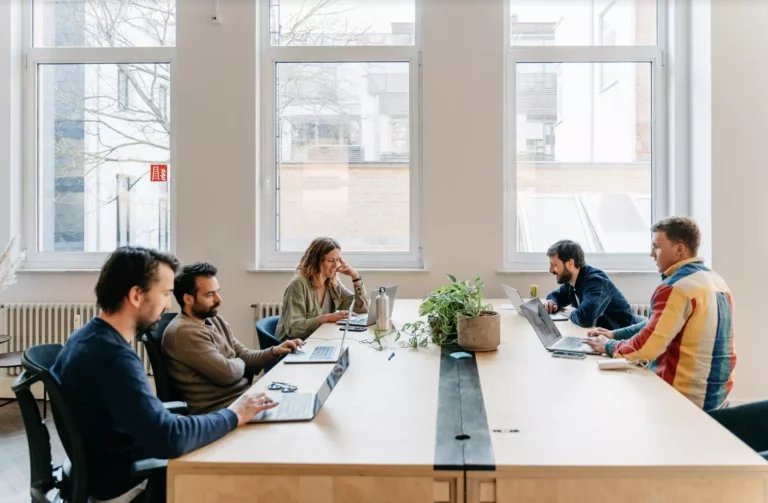"You’ve got a lot of balls"
- Some stranger on a plane
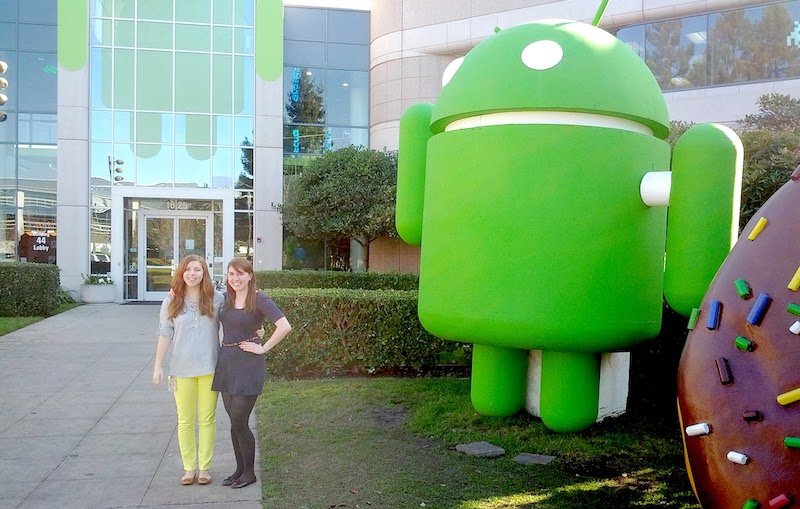
After working at Google for 7 years, I left Silicon Valley to move to Belgium and join Board of Innovation. The number-one question I got (and still get) from family, friends, strangers, and co-workers on both sides: “Why?”
I’ve always considered myself a sampler; I try anything and everything. Combined with a need for constant learning, let’s just say I’m a very dangerous combo at parties – not only do I sample all the snacks, I also ask a LOT of questions. I knew what the word “inquisitive” meant by age 9 as a result of following people around asking them question… after question…after question. As I got older I learned more social skills (phew!), but I didn’t lose the drive to understand the world around me, specifically when it came to people and the why’s and motivations behind their actions. I even picked my university based on the breadth of the course catalog, and took classes on everything from group decision making and social influence and persuasion to anthropology of food and cuisine. So, naturally, during the course of my last 7 years working at Google, I tried a variety of different roles and projects and really sampled it all.
At Google I worked in cross-functional roles across operations, engineering, program management and user experience – and my roles cut across lines to interact with legal, business development, marketing and more – B2B and B2C. I also worked with teams from Dublin to Japan, learning how to work across different cultures. I was lucky enough to have been in an environment that promoted that sort of trial and movement too – in fact, I spent my 20% time getting my foot in the door in the design thinking space, and was a lead for the Design Sprint Academy at Google. When I left, I really had felt like I had made the most of my experience and had learned about the company from as many angles, working with as many people as possible, creating my own path along the way (at one point I had even pitched a role for myself that turned into a global team!).
I could have kept hopping around and trying new things forever there, working with amazing, creative, brilliant people at a company that I respected and admired. So, if I was getting all of this great opportunity and working with so many people I loved, why then did I decide to make the big decision to leave? And why now?
For people that leave Google, there are only a few “acceptable” paths:
- you’re founding your own company
- you’re totally burnt out and want to reset and/or travel the world, or
- you want to learn more, so you go back to school.
It’s almost impossible to break out of the “golden handcuffs” of Google to go directly to another company, because when you hold up any other company next to it, Google always wins on perks, benefits and salary alone. But after 7 years, I had realized that I needed to rethink my criteria for what makes a right job for me.
“I know I need a change, but I don’t know what I want to be.”
- Everyone in their late 20's
I say ‘what makes a job right for me’ because, at the end of the day, I began to realize that a job isn’t a company: I absolutely loved Google, but I had the nagging feeling my job and the work I was doing wasn’t a fit, and it was only nagging me more. I moved within Google and tried to find my ‘home,’ but it didn’t seem to really exist. I had a hard time looking for guidance because I couldn’t find anyone with a similar profile or interests. I looked up to people in my same job ladder and thought “I respect you a lot, but I don’t want to be you”. I wasn’t waking up in the morning excited to go to work, and I definitely wasn’t reading books and articles about program management in my spare time. And even though I loved design sprinting, innovation strategy and facilitation in my 20% time, there were no opportunities to make a full-time role out of them, so I was trying to fit myself into a box that didn’t quite work: a program manager that ALSO runs design sprints just wasn’t cutting it.
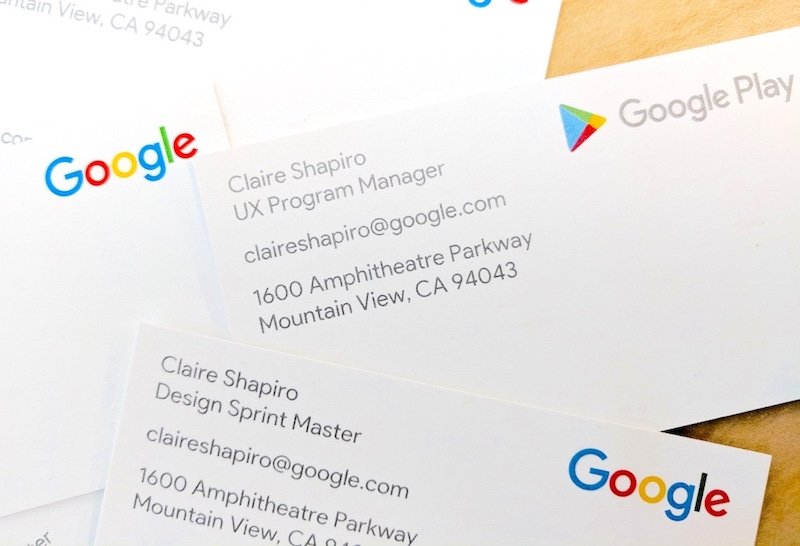
Also, I was feeling more and more like I lived in a big tech bubble. I heard somewhere that the 5 people you’re closest to shape who you are, but what about the 500 people I surround myself with? I was feeling more and more like the people I walked past every day were looking and sounding more and more homogeneous (sorry tech world, I know you’re working on the whole diversity thing, but it’s slow going).
I daydreamed about living in new places and seeing new faces around me. The perks and novelty of a job at Google as a company were wearing off, and I realized I was in the same spot as most other 20-something people out there: completely unsure of my next move. I wanted a company fit and a job fit, and was completely lost on how to get there.
“If only I knew what I wanted to do with my life...”
- Also everyone in their mid to late 20's

I started with what I knew best: asking questions. I talked to people – a LOT of people – in various jobs, industries, and with a variety of feelings about their job and role fit. I met with people in and outside of tech, current and former consultants, CEOs and founders. I talked to former MBA’s and MBA dropouts. I talked to people that absolutely hated their jobs, and those that felt they found their calling in life. I talked to freelancers, fashion designers, and artists. Not only did I ask about their experiences, I asked for targeted advice based on what they knew about me. I used this crowd-sourced mentorship (which to be honest was more deep empathy insights gathering) to learn a lot very quickly. It helped me shape a realistic picture of what my life might look like down a variety of different paths.
After contemplating business school, freelancing, starting my own company and more and subsequently deciding those weren’t the right path for me (that could be its own article, so I’ll spare you), I thought a lot about how I had been spending my time. Out of everything I was doing, what were the activities that got me completely energized? Throughout my last years at Google, I had tried a lot of seemingly unconnected things, just because they seemed interesting. One opportunity led to another: I said yes to work as a matchmaker, yes to improv theater, yes to work for a couple of dating startups, and yes even to work in a yoga studio, just to force myself out of the Google bubble and see how it felt. I said yes to volunteer my time doing design sprints, and the design sprint team came knocking on my door.
As time went on, these small things led to bigger things, more opportunities, and more learnings. Friends started approaching me with freelance gigs to help them run strategy and vision workshops. When I took a step back, my sampling and side-hustles and 20% projects were telling me something about myself and my needs in a next job. I didn’t realize it at the time, but all of these things were signals, mini-experiments, building my skills and experience that would later springboard me to Board of Innovation. And I realized that once I started looking outside of Google, there were jobs that I never knew existed that were perfect for me and my skills – I just hadn’t seen them before because I was only looking at things through a tech and Google point of view (side-note: this was the part where I was really, really happy I didn’t decide to spend a bunch of money and go to business school).
So, unbeknownst to me, I had the answers all along (cue angels, birds and epiphany music). That all-over-the-place generalist problem solver within me, combined with a love of working with people and facilitating design sprints, was perfect for a job of innovation consultant – a job I didn’t know existed. And I wasn’t alone; Julie’s article: “Why I knew I was right for a job that didn’t exist yet (and how I got it)” landed on my feed, and it completely resonated with me. I read it, re-shared it, set up a ‘virtual tea’ with her, and knew immediately that the BOI team was a perfect fit (despite being halfway across the world); the work was always different, spanned the globe and had a huge impact. The goals were ambitious (the BOI mission is to inspire 100 million people). Due to the size, every person had a major impact. And to top it all off, there was an incredible culture: every single person I met was incredibly smart, charismatic, humble, authentic, self-aware, and had a great sense of humor; all qualities I had a hard time finding in any other comparable company I was talking to. When Julie and I met, the team was doing beer yoga in the background and running around with nerf guns (it was a Friday, to be fair). On top of that, they were multi-disciplinary and energizing to talk to; they really knew their stuff. These were people I could see myself collaborating with every day (while having a lot of fun in between). I realized I hadn’t felt as excited and motivated like this in years.
“If you could do this for free, just for a year, just for the experience… would you do it?”
- My friend max
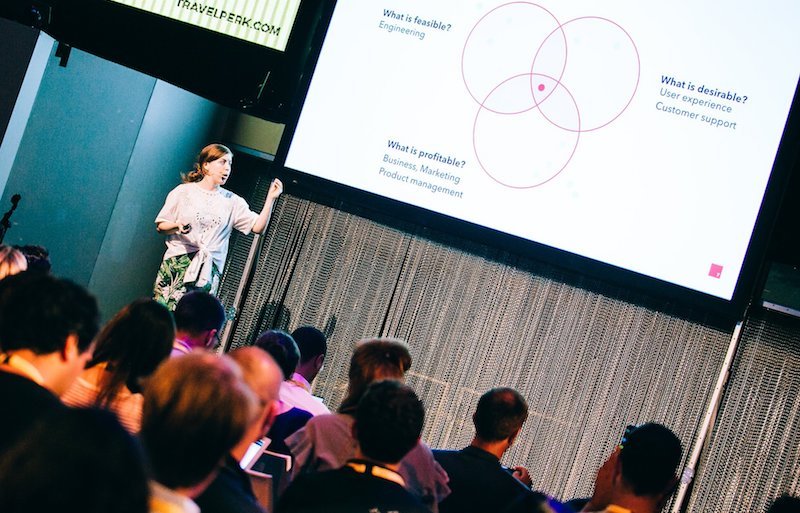
After the “Why” question is answered, usually I hear something like: “But, how did you do it?” Even if I liked the job and company, how did I feel OK taking such a leap? I had never worked in other sectors, never in a small company, and had never even set foot inside Belgium before.
Also, I cut my very, very comfortable and generous Google salary in half. This was a big personal and financial risk. I do have to say it wasn’t something that happened overnight – I de-risked my decision over about 6 months where I asked a lot of questions, ran hypothetical scenarios in my head, and again talked to as many people as possible. My best friend Max made it really simple; he asked “If you could do this for free, just for a year, just for the experience… would you do it?” The answer was a no-brainer: absolutely – 100% – yes.
I wasn’t the first person to do something like this, either. I thought back to what ex-Googlers before me had said all along. In 2013, a friend-of-a-friend (and fellow ex-Googler) said that we were ‘too young to be this comfortable,’ before jumping ship from Google himself. A year later another friend (another fellow ex-Googler) told me that one day I’d wake up and wouldn’t need to be at Google anymore. She was right. And then last year when Trump got elected, I realized that nothing in this world is predictable or stable. And it was then I knew that the golden handcuffs were just a mental barrier I had been holding on to, and it was surprisingly easy to let go.
To be honest, when I actually signed my contract it still didn’t feel fully comfortable, especially the financial part. But, that was still OK: a little discomfort was actually the best sign I was doing something right. And you can bet I did a lot of research and asked a lot of questions along the way to make sure I knew what I was getting into. And so far, I’ve had virtually no surprises, and been really, really happy with the outcome, the role and the company. To date, I’ve worked at Board of Innovation for 3 months, I’ve keynoted at two conferences, and traveled to 5 countries for 8 clients for projects big and small – from one-day crash-course training to one-week design sprints to multi-month radical design projects. It’s crazy and moves faster than anything I’ve ever done, but it’s stretching me in new ways and exposing me to all sorts of different industries and cultures. I just wrapped up my first big project as project lead, and it was rewarding in a way that I never found at Google on any of my past projects.
“So, okay, what about now?”
- Me again
Google is and always will be part of my identity, part of my formative years and honestly I consider it my (free!) alternative to an MBA. In fact, I still catch myself saying “we” instead of “they” when I talk about my time there. But to me, that’s the best part of all of this: I was lucky enough to make a decision less out of end-of-the-road frustration, and instead out of possibility. Instead of being paralyzed by not having it all figured out, I invested in myself and sampled everything that interested me. And at the end of the day it led to a job so perfect, it was an uncomfortably excited: “Yes!,” I chose chaos over comfort. I chose novelty and change. I chose to invest in myself. I chose to leave one amazing company and team for an equally amazing company and team.
So now, here comes the real talk portion:
Do you feel in a comfort zone with your job? Do you feel like you’re compromising by doing something that just isn’t completely you? Do you feel boxed in, wanting to stretch yourself beyond your industry, country or role? Stuck in a place that feels one-note? You know you should make a change, but you don’t know in which direction, or how? And if you know, maybe you don’t feel brave enough to do it? My suggestions are to first take inventory about what matters most for you, especially related to the future you imagine for yourself (I used Woopah, a free-writing visioning exercise), second ask yourself what energizes you even if it seems completely out there: say YES to any opportunity in that area (even if you give up valuable Netflix time to do it!). And last but not least, talk to people – ask questions of a diverse group of people to get genuine advice and see how it relates to your path. Crowdsourced mentorship was the best way I found what I was looking for, and also the best way I confirmed it once I found it.
That said, I’d love to pay it forward over a virtual coffee (that’s how it all started for me, after all!) if you want to hear more about my journey, my role at Board of Innovation or if you even have a question about innovation work.
